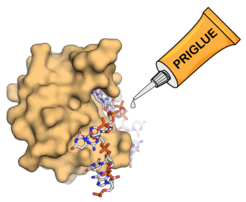ERC Starting Grant for Peter ‘t Hart
Max Planck Researcher from Dortmund receives €1.5 million to develop innovative molecular glues with therapeutic potential
Peter ‘t Hart, Group Leader at the Chemical Genomics Centre of the Max Planck Society in Dortmund has received the highly coveted European Research Council (ERC) Starting Grant endowed with €1.5 million. In the next five years ‘t Hart’s group wants to identify and develop molecular glues that stabilize the interaction of proteins with RNA, which are essential in physiology and disease. The so called PRIGLUEs will be applicable as novel tools for RNA biology but can eventually also lead to the development of innovative therapeutics.
“In drug development scientists are always looking for new ways to target disease-related biomolecules,” says Peter ‘t Hart, who just received the prestigious ERC Starting Grant. A novel strategy to target troublesome proteins is to stick them to other proteins that usually do not bind by using molecular glues. Sticking can either shut down or turn up a protein’s activity, depending on the circumstances. A prominent and promising approach that exploits molecular glues is the targeted protein degradation, where troublesome proteins are glued to a protein-tag, that is recognized and processed by the cell’s garbage disposal system.
Finding the right glue

So far, this sticking strategy has been only applied to glue proteins, however, a lot of cellular regulation also happens on the post-transcriptional level through the binding of proteins to RNA, the material that encodes all information for producing proteins. This is where Peter ’t Hart’s research plan kicks in: He wants to develop a screening method to identify novel molecular glues that actually target these protein-RNA-interactions. “The crux of the matter is to find the right glue for the RNA sequences,” says ‘t Hart. Proteins offer a complex surface with accessible cavities, that can be occupied by specifically designed small molecules. RNA however, has a much lower structural complexity, which makes it very challenging to find a molecule that binds only one specific RNA. To overcome this obstacle the project aims to test a wide range of small molecules, but also cyclic peptides, known to bind the structurally related DNA. The developed glues will be applied to the area of RNA splicing, a process where pre-mRNA is processed into mature mRNA. This has many advantages: protein-RNA interactions are abundant in splicing, changes can be analyzed by common methods and undesired changes in splicing can lead to various diseases.
Peter ’t Hart studied drug innovation at the Utrecht Institute of Pharmaceutical Sciences where he also finished his doctoral studies. During his Postdoc in the Department of Prof. Herbert Waldmann at the Max Planck Institute of Molecular Physiology in Dortmund he developed cyclic peptide inhibitors of complexes involved in epigenetic regulation. Since 2018 he is group leader at the Chemical Genomics Centre of the Max Planck Society.

Every year, the European Research Council awards the prestigious Starting Grants to young researchers who are still at the beginning of their scientific career but have already proposed a comprehensive, independent research project. The application process is highly competitive: every year thousands of proposals are submitted, but only approximately ten percent receive the financial support over the next five years.

